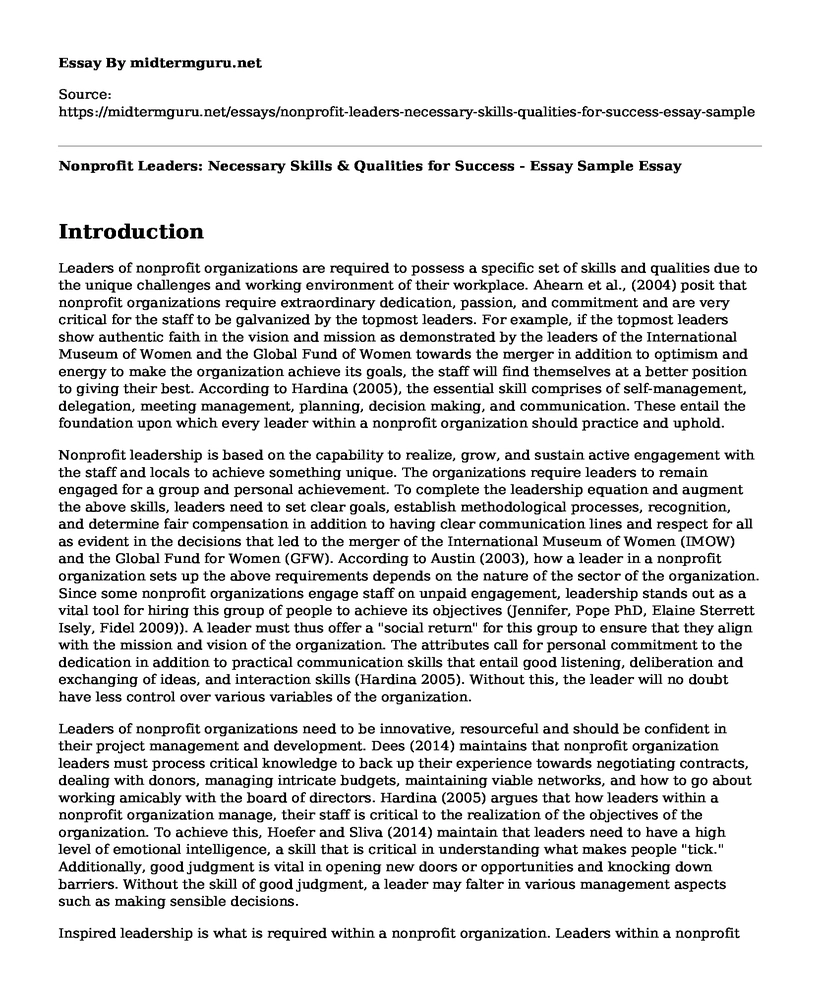Introduction
Leaders of nonprofit organizations are required to possess a specific set of skills and qualities due to the unique challenges and working environment of their workplace. Ahearn et al., (2004) posit that nonprofit organizations require extraordinary dedication, passion, and commitment and are very critical for the staff to be galvanized by the topmost leaders. For example, if the topmost leaders show authentic faith in the vision and mission as demonstrated by the leaders of the International Museum of Women and the Global Fund of Women towards the merger in addition to optimism and energy to make the organization achieve its goals, the staff will find themselves at a better position to giving their best. According to Hardina (2005), the essential skill comprises of self-management, delegation, meeting management, planning, decision making, and communication. These entail the foundation upon which every leader within a nonprofit organization should practice and uphold.
Nonprofit leadership is based on the capability to realize, grow, and sustain active engagement with the staff and locals to achieve something unique. The organizations require leaders to remain engaged for a group and personal achievement. To complete the leadership equation and augment the above skills, leaders need to set clear goals, establish methodological processes, recognition, and determine fair compensation in addition to having clear communication lines and respect for all as evident in the decisions that led to the merger of the International Museum of Women (IMOW) and the Global Fund for Women (GFW). According to Austin (2003), how a leader in a nonprofit organization sets up the above requirements depends on the nature of the sector of the organization. Since some nonprofit organizations engage staff on unpaid engagement, leadership stands out as a vital tool for hiring this group of people to achieve its objectives (Jennifer, Pope PhD, Elaine Sterrett Isely, Fidel 2009)). A leader must thus offer a "social return" for this group to ensure that they align with the mission and vision of the organization. The attributes call for personal commitment to the dedication in addition to practical communication skills that entail good listening, deliberation and exchanging of ideas, and interaction skills (Hardina 2005). Without this, the leader will no doubt have less control over various variables of the organization.
Leaders of nonprofit organizations need to be innovative, resourceful and should be confident in their project management and development. Dees (2014) maintains that nonprofit organization leaders must process critical knowledge to back up their experience towards negotiating contracts, dealing with donors, managing intricate budgets, maintaining viable networks, and how to go about working amicably with the board of directors. Hardina (2005) argues that how leaders within a nonprofit organization manage, their staff is critical to the realization of the objectives of the organization. To achieve this, Hoefer and Sliva (2014) maintain that leaders need to have a high level of emotional intelligence, a skill that is critical in understanding what makes people "tick." Additionally, good judgment is vital in opening new doors or opportunities and knocking down barriers. Without the skill of good judgment, a leader may falter in various management aspects such as making sensible decisions.
Inspired leadership is what is required within a nonprofit organization. Leaders within a nonprofit organization need not wait for a crisis to put into effect their most necessary skills such as good judgment and the ability to make sensible decisions (Austin 2003). A leader who puts into practice the above skills earns respect, support, and confidence of the staff, board, and the locals who comprise of the primary stakeholders of the organization. The above skills are essential towards helping the leader drive the organization to achieve its objectives and goals. Nurturing the above leadership skills within the nonprofit organization helps other employees gain organizational knowledge, this helps the top leaders navigate through the challenges of managing and leading the organization.
References
Ahearn, K. K., Ferris, G. R., Hochwarter, W. A., Douglas, C., & Ammeter, A. P. (2004). Leader Political Skill and Team Performance. Journal of Management, 30(3), 309-327. https://doi.org/10.1016/j.jm.2003.01.004
Austin, M. J. (2003). The Changing Relationship Between Nonprofit Organizations and Public Social Service Agencies in the Era of Welfare Reform. Nonprofit and Voluntary Sector Quarterly, 32(1), 97-114. https://doi.org/10.1177/0899764002250008
Dees, J. G. (2014, August 01). Enterprising Nonprofits. Retrieved June 8, 2019, from https://hbr.org/1998/01/enterprising-nonprofits
Hardina, D. (2005). Ten Characteristics of Empowerment-Oriented Social Service Organizations. Administration in Social Work, 29(3), 23-42. doi:10.1300/j147v29n03_03
Hoefer, R., & Sliva, S. M. (2014). Assessing and Augmenting Administration Skills in Nonprofits: An Exploratory Mixed Methods Study. Human Service Organizations: Management, Leadership & Governance, 38(3), 246-257. https://doi-org.ezproxy.umuc.edu/10.1080/23303131.2014.892049
Jennifer A. Pope PhD, Elaine Sterrett Isely, Fidel AsamoaTutu. (2009) Developing a Marketing Strategy for Nonprofit Organizations: An Exploratory Study. Journal of Nonprofit & Public Sector Marketing 21:2, pages 184-201.
Cite this page
Nonprofit Leaders: Necessary Skills & Qualities for Success - Essay Sample. (2023, Jan 19). Retrieved from https://midtermguru.com/essays/nonprofit-leaders-necessary-skills-qualities-for-success-essay-sample
If you are the original author of this essay and no longer wish to have it published on the midtermguru.com website, please click below to request its removal:
- Bureaucratic Forms of Organization are Soley Determined by Rules and Regulations
- Essay Sample on Effective Communication and Teamwork in Regards to Ideas From Johari Window
- The Samsonite Organization - Evaluation Paper
- Interview Example on CEO of the Orascom Company
- Self-Actualization: Maslow's Theory of Motivation and Social Justice - Essay Sample
- Patty McCord's Freedom and Responsibility at Netflix - Essay Sample
- Demarco: Balancing Care for Environment, Country & Employer - Essay Sample







